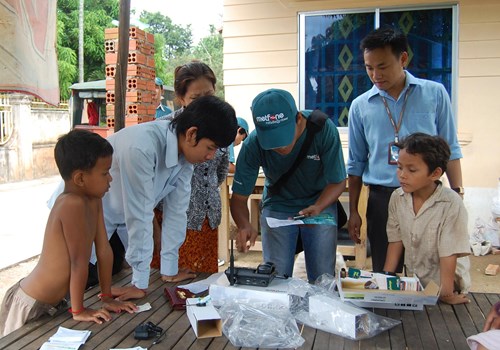Connecting leaders of the trio
Over a year ago, at CLV-9 organized in Siem Riep, Cambodia, the trio’s Prime Ministers agreed on the establishment of a teleconference system that would link their offices, including the Office of the Government of Vietnam. The task was assigned to Viettel because the group was demonstrating that they had a strong and synchronous infrastructure in all three countries. Therefore, it was ideally to undertake the project.
This January, Viettel inaugurated the system that enables quick and effective discussions among the trio, shortening the distance in geography and supporting any ongoing diplomatic activities. It also facilitates negotiations, consultations and agreements among the trio’s offices at any time.
Abolishing charge gap
Also at CLV-9, Prime Minister Nguyen Xuan Phuc suggested the abolition of international roaming charges among the three nations, creating favorable conditions for their people to travel and exchange information.
    |
 |
|
A Metfone employee introducing a service to Cambodian people |
Immediately, Viettel realized that unique suggestion. Accordingly, since January 1, 2017, Viettel’s subscribers in Vietnam, Laos and Cambodia have enjoyed charges for international calls in the Indochina region and data usage reduced by more than 13 times and for messaging reduced by nearly 10 times. Specifically, it costs callers only VND 2,000 per minute for a call to Vietnam if the receivers are Viettel’s subscribers. Besides, calls made to Unitel or Metfone accounts are charged at only VND 2,000 per minute and data load is charged at a rate of VND 200 per Mb.
Viettel’s changed policy balanced the international roaming charge among Viettel in Vietnam, Unitel (Viettel’s brand in Laos) and Metfone (Viettel’s brand in Cambodia) and local call charge.
After one year, thanks to Viettel’s application of new roaming charge for the Indochina region, its roaming subscribers in the region increased sharply with the average growth rate of 98 percent (equivalent to 38,859 subscribers per month).
Attentively, the subscribers for roaming services in Laos in 2017 increased by 3 times compared to those in 2016 and the subscribers in Cambodia was up by 1.6 times.
Especially, customers also boosted data usage of different services from Viettel provider. Data usage of customers using roaming services in Laos and Cambodia was up by more than 20 times in 2017 against 2016. The rapid increase in outgoing calls was also seen in Laos and Cambodia. Accordingly, customers’ duration for outgoing calls in Laos in 2017 rose by 15 times compared to that in 2016 and in Cambodia was up by 5 times.
As a result, the reduction in international roaming charge enabled more communication among people in the trio, boosting their mutual understanding and creating trade opportunities in the three nations.
The aforementioned roaming policy was considered a historical landmark in the global telecoms industry and the trio officially became the first nations in the world enjoying no gap in telecommunications services. The policy was also a new model of the flat world in telecommunications, creating an important driving force for trade-economic exchange, culture, tourism, tightening the close neighborliness in the region, and having impact on other global economic blocs to multiply the policy.
After that success, on March 30, Viettel announced a 99 percent discount for international roaming services in Myanmar, the Philippines and Indonesia.
Building the most modern telecommunications and information technology infrastructure
Together with charge reduction, Viettel has invested substantially in the 4G network in ASEAN member countries where it has a presence. Now, 100 percent of Viettel’s 4G base transceiver stations have applied 4T4R, the latest technology that allows the expansion of the coverage area by 1.4 times and an increase in download speed by nearly 2 times compared to the popular 2T2R technology. Laos and Cambodia are the two nations where Viettel has deployed the 4G technology before Vietnam (June 2015 in Laos, May 2016 in Cambodia and April 2017 in Vietnam).
The modern 4G infrastructure served as Viettel’s foundation for a series of its 4.0 projects in different fields, such as e-government, e-payment, education, agriculture, transport and security with the aim of universalizing telecoms services, building sustainable telecoms infrastructure, creating foundations for the presence of telecoms and information technology in all fields of life, making specific contributions to the enhanced development of connectivity of Vietnam, Laos, Cambodia as well as other ASEAN member countries.
Translated by Mai Huong